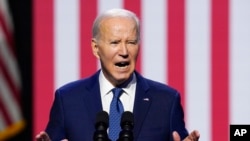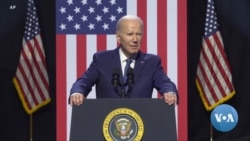U.S. President Joe Biden sharpened his attacks against Donald Trump on Thursday, delivering his most forceful assertion to date that the former president and Republican front-runner represents an existential threat to the country’s democratic values and institutions.
In a speech in the western state of Arizona, Biden charged that Trump holds the "dangerous notion" that he has unchecked power and is above the law.
"Trump says the Constitution gave him, quote, the right to do whatever he wants as president, end of quote. I've never heard a president say that even in jest," Biden said. "Not guided by the Constitution or by common service and decency toward our fellow Americans, but by vengeance and vindictiveness."
Trump in 2019 said he has such rights under Article II of the Constitution, which describes the powers of the president. In March, he told supporters, "I am your justice. And for those who have been wronged and betrayed, I am your retribution."
"There’s something dangerous happening in America right now," Biden declared in Arizona, adding that American democracy is "still at risk."
The speech is his fourth in a series of presidential addresses that lays out what he sees as the dangers of election denialism and political violence that have loomed over the country since thousands of Trump supporters attacked Capitol Hill on Jan. 6, 2021, seeking to overturn Biden’s electoral victory.
"There is an extremist movement that does not share the basic beliefs in our democracy — the MAGA movement," the president said, referring to his predecessor’s slogan, "Make America Great Again." He warned that their "extreme agenda, if carried out, would fundamentally alter the institutions of American democracy."
"They're not hiding their attacks," Biden said. "They’re openly promoting them, attacking the free press as the enemy of the people. Attacking the rule of law as an impediment. Fomenting voter suppression and election subversion."
There was no immediate response from Trump, who holds a commanding lead in the race for the 2024 Republican presidential nomination, or from his campaign organization.
Biden has until now avoiding painting mainstream Republicans with the same brush as Trump’s most ardent supporters, whom he describes as MAGA Republicans. But this time Biden suggested that they are complicit.
"Although I don't believe even a majority of Republicans think that, the silence is deafening," he said, pointing to Republican reaction to Trump's recent suggestion that General Mark Milley, the chairman of the Joint Chiefs of Staffs who will soon step down from his post should be executed for allegedly betraying the former president.
Biden’s speech came the same day that House Republicans held their first hearing in a Biden impeachment inquiry, over allegations of corruption in relation to his son Hunter’s business dealings. The Republicans detailed foreign payments to members of the Biden family but did not provide evidence that the president had benefited from the funds.
The White House denies any wrongdoing and dismisses the investigation as politically motivated.
Harshest rhetoric
While Biden has long branded the MAGA movement as an existential threat to democracy, Thursday’s speech contained some of his harshest rhetoric against Trump, who is facing four criminal indictments with a total of 91 charges ranging from falsifying business records to seeking to subvert the 2020 presidential election.
Trump has denied wrongdoing in all charges.
For months, Biden had remained mostly silent about his predecessor, likely to avoid giving credence to Trump’s assertions that the charges against him are evidence that Biden is weaponizing the justice system against a political opponent. The White House denies the allegation.
Biden did not mention any of Trump’s legal troubles in his speech, a sound strategy according to some observers.
"There's plenty about Trump's behavior in office and statements of what he will do if he wins in 2024 that Biden can point toward without having to say, 'Oh, and by the way, he's facing jail time,'" said William Howell, a professor in American politics at the University of Chicago.
Warnings of a threat to democracy posed by Trump’s MAGA movement could resonate in Arizona, a former Republican stronghold that in recent years turned into a swing state and has seen its share of efforts by Trump supporters to discredit 2020 election results.
The White House selected the state as the speech venue precisely for those reasons, as well as to honor the late Arizona Senator John McCain, the 2008 Republican presidential nominee who died in 2018, whom Biden referred to as a "brother."
Biden announced federal funding to construct the McCain Library at Arizona State University, using the American Rescue Plan Act, the $1.9 trillion COVID relief package passed in 2021.
Speaking before Biden, former Ambassador Cindy McCain said Biden and her late husband maintained decades of friendship despite deep political differences.
Biden contrasted McCain’s legacy and the late senator’s principle to "put partisanship aside and put country first," to those espousing political violence.
"Democracy means rejecting and repudiating political violence," he said. "Regardless of party, such violence is never, never, never acceptable in America."
Do Americans care?
As Biden gears up to fight for a second term, his campaign strategists believe that defending democratic institutions and values remains a resonant theme for voters — a reason that the video announcing the president’s reelection run opened with footage of the Jan. 6 attack.
However, polls show the economy is the issue that weighs most on voters’ mind. According to a recent Reuters/Ipsos survey, 49% of Americans say inflation or price increases are the most important issues facing the country; 9% cite unemployment, and 10% cite economic inequality.
Various polls show Biden's public approval rating stagnating below 50% since August 2021, largely due to concerns over his handling of the economy.
Attacks on American democracy may not be the No. 1 concern among voters, Chicago University’s Howell told VOA, but it’s not trivial, either, so it’s no surprise that Biden is homing in on the issue.
"If you think about democracy as a kind of a catchall category, not just for concerns about rising authoritarianism but also just the ability for our country to govern itself, concerns about rising polarization, whether or not we're going to have another government shutdown — these kinds of things ... will resonate with some voters," Howell said.
As Biden spoke, his White House blasted out messages counting down the hours until Oct. 1, the day of a potential partial government shutdown should Congress fail to approve funding for federal agencies. The administration blames the impasse on "extreme House Republicans’ chaos and inability to govern."
Republican front-runner
Despite his legal woes, Trump remains the dominant force in his party. A recent Ipsos/Reuters poll shows the former president is supported by 47% of Republican primary voters, a group that amounts to roughly a third of the American electorate.
Trump’s position with Republican primary voters has only strengthened over the year as various indictments have rolled out, said Chris Jackson, a senior vice president at Ipsos.
"That's happening at the same time that his position with the general public is not necessarily strengthening the same way," Jackson told VOA.
A Reuters/Ipsos poll found that Biden and Trump are tied in a hypothetical November 2024 election, with both receiving 39% of the vote and one in five voters undecided.






